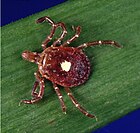Trombidiformes
| Trombidiformes Temporal range:
| |
|---|---|

| |
| Trombidium holosericeum | |
| Scientific classification | |
| Domain: | Eukaryota |
| Kingdom: | Animalia |
| Phylum: | Arthropoda |
| Subphylum: | Chelicerata |
| Class: | Arachnida |
| Superorder: | Acariformes |
| Order: | Trombidiformes |
| Suborders | |
Trombidiformes is a large, diverse order of mites.
Taxonomy
[edit]In 1998, Trombidiformes was divided into the Sphaerolichida and the Prostigmata.[1] The group has few synapomorphies by which it can be defined, unlike the other major group of acariform mites, Sarcoptiformes.[1] Its members include medically important mites (such as Demodex, the chiggers, and scrub-itch mites) and many agriculturally important species, including the spider mites (Tetranychidae).[1] The superfamily Eriophyoidea, traditionally considered members of the Trombidiformes, have been found to be basal mites in genomic analyses, sister to the clade containing Sarcoptiformes and Trombidiformes.[2]
The 2004 classification retained the two suborders, comprising around 125 families and more than 22,000 described species.[3]
In the 2011 revised classification, the order now contains 151 families, 2235 genera and 25,821 species, and there were another 10 species with 24 species that present only as fossils.[4] These 151 families were classified into the same two major suborders[4]:
- Sphaerolichida OConnor, 1984: Now contains only two families;
- Prostigmata Kramer, 1877: Still the biggest branch in this taxon, with four infraorders and 40 superfamilies.
See also
[edit]
e.g. Hydrachnidae
e.g. others:
References
[edit]- ^ a b c Heather Proctor (August 9, 1998). "Trombidiformes. Trombidiform mites". Tree of Life Web Project. Retrieved June 9, 2010.
- ^ Arribas, Paula; Andújar, Carmelo; Moraza, María Lourdes; Linard, Benjamin; Emerson, Brent C; Vogler, Alfried P (2020-03-01). Teeling, Emma (ed.). "Mitochondrial Metagenomics Reveals the Ancient Origin and Phylodiversity of Soil Mites and Provides a Phylogeny of the Acari". Molecular Biology and Evolution. 37 (3): 683–694. doi:10.1093/molbev/msz255. hdl:10261/209118. ISSN 0737-4038. PMID 31670799.
- ^ David Evans Walker (2004). "Hidden in Plain Sight: Mites in the Canopy". In Margaret Lowman, H. Bruce Rinker (ed.). Forest Canopies. Physiological Ecology Series (2nd ed.). Academic Press. pp. 224–241. ISBN 978-0-12-457553-0.
- ^ a b Zhang, Zhi-Qiang; Fan, Qing-Hai; Pesic, Vladimir; Smit, Harry; Bochkov, Andre V.; Khaustov, A. A.; Baker, Anne; Wohltmann, Andreas; Wen, Tinghuan; Amrine, James W.; Beron, P.; Lin, Jianzhen; Gabrys, Grzegorz; Husband, Robert (2011). "Order Trombidiformes Reuter, 1909" (PDF). In Zhang, Z.-Q. (ed.). Animal biodiversity: An outline of higher-level classification and survey of taxonomic richness. Magnolia Press. pp. 129–147. doi:10.11646/zootaxa.3148.1.24. ISBN 978-1-86977-850-7. ISSN 1175-5334.
{{cite book}}:|journal=ignored (help)
External links
[edit] Media related to Trombidiformes at Wikimedia Commons
Media related to Trombidiformes at Wikimedia Commons Data related to Trombidiformes at Wikispecies
Data related to Trombidiformes at Wikispecies

